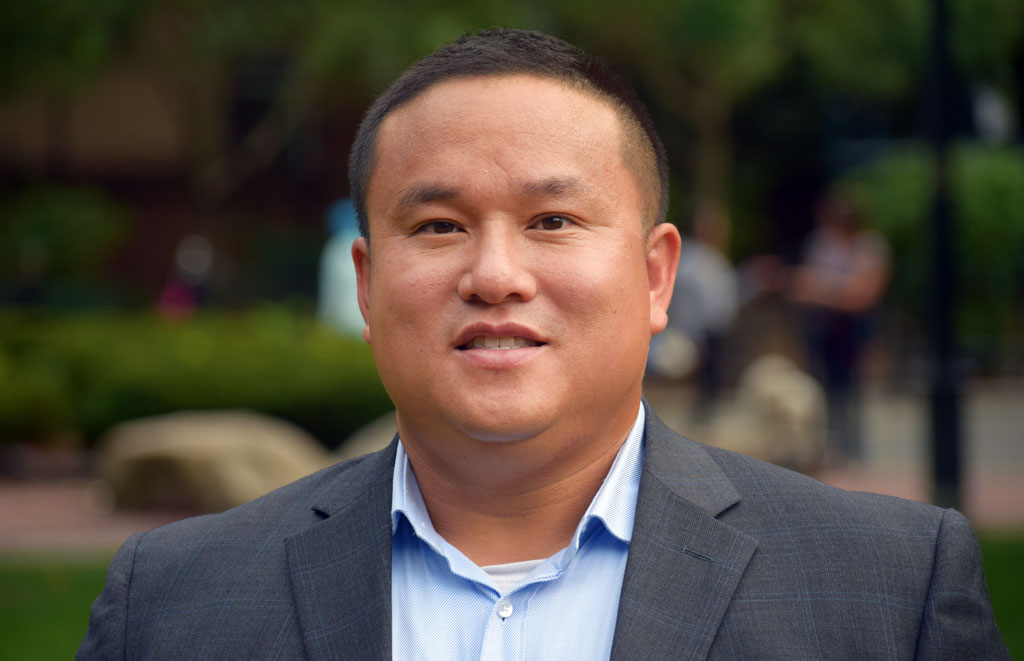Christopher Lim for School Committee, 2019
Challenger running for committee for the first time

The candidate’s website | Facebook | Twitter
Background: Engineering | Focuses: Accountability, staffing, after-school programs
Q&A
School Committee candidates were asked by parent Piotr Mitros if they would be interviewed. Of the 11, three did not respond to emails; one declined; and one declined to have their interview recorded. We provided interview questions to the candidates a week before the interview to give time to prepare. Due to the length of the interviews, we have summarized answers, with links to audio for more depth.
[Note: Lim is the first committee candidate of Asian descent as far as we could find. The student body is 14 percent Asian students, and considerably more immigrant students.]
Why run? The two main issues that drew Lim into district politics were included extended-school day discussions that shifted inconsistently and were frustratingly lacking in specifics about what would be done with the time, what we wanted to achieve and how outcomes would be measured. In addition, he saw growing behavior problems in the classroom as children entered the fourth, fifth and sixth grades, and teachers who had no means to deal with the issues, either because of insufficient staffing or the lack of a districtwide approach. Many episodes were racial in nature, and discussions that were needed about that were lacking, which was “difficult to see as a parent.”
![]()
One thing. First and fastest, Lim would want to see district-level tracking of behavioral outbursts and racial disturbances. When these issues come up, families or schools are made to feel like outliers. Lim would work with the teacher’s union and district on a standard for how we understand, track, and address these issues.
![]()
Vision and direction. Lim was not a fan of the Innovation Agenda. The schools had personalities, and communities centered around their ideals who were active in the schools’ success – and while the old system may have had problems, this was a costly approach that may not have solved them. It leaves the upper schools a weak link among wonderful elementary schools and a high school that does very well for many students. Work is needed on building community and transparency there.
![]()
How much time could you devote? Lim tends to throw himself into project, sacrificing sleep to get work done, and sees this as a 30-hour-per-week obligation. He’s committed.
![]()
Upper schools and math. Even Belmont’s highly regarded middle schools, where his wife teaches, face challenging times. One problem is that when we implement change, it’s often top-down and may not align with what educators think is best for students or what helps achieve classroom goals. Lim wants to build time for professional development that includes peer observation and an exchange of best practices between schools. Testing is also imperfect, and other types of data can be used to better understand educational gaps.
![]()
Cultural expectations at schools. Lim grew up in a family and cultural background that stressed academic rigor and hard work, but recognizes that everyone wants something different from an educational system. His goal is to build one that allows everyone to achieve what they want around the Common Core and things mandated by law. He didn’t find it sensible to tear apart what’s been built with the Innovation Agenda, but supported more diversity between schools.
![]()
Academic diversity. Lim went through a heavily tracked education system and recognizes the weakness of the system, but believes serving different groups in one classroom is possible with small class sizes. He described the work at the Level Up program as “profound.” He prefers to keep kids in the same age range, in part due to social-emotional and behavioral aspects of education. But he is not against the idea that some kids might be ready to take classes a few levels higher. In the short term he wants support for kids who are behind, including tutoring and working with families and on social issues, but structured to avoid shame from being perceived as failing educationally. In the search for equity, he fears we’ve left behind outliers on both ends.
![]()
Family engagement and family rights. Committee members need to be out in the community to ensure all groups and points of view are being heard, but community members need to be encouraged to share. Since members get only a two-year term, they need to work together on issues they hear in the community, and parents’ engagement should be more regularly turned into action. Lim supports parents’ access to reports and records about their children and curriculum – and is confused by “arbitrarily” split school councils and “friends” groups that support a school. They should be integrated.
![]()
Outcomes and testing. In general, Lim is a realist about MCAS and the like, but also not a fan of high-stakes testing – especially from for-profit companies and especially when it moves down to upper and elementary schools from the high school level.
![]()
Closing thoughts? Lim wants to apply his skills as a systems engineer to put processes in place that lets the district act more nimbly on feedback from the community – and to see those improvements begin within a two-year term in office.


